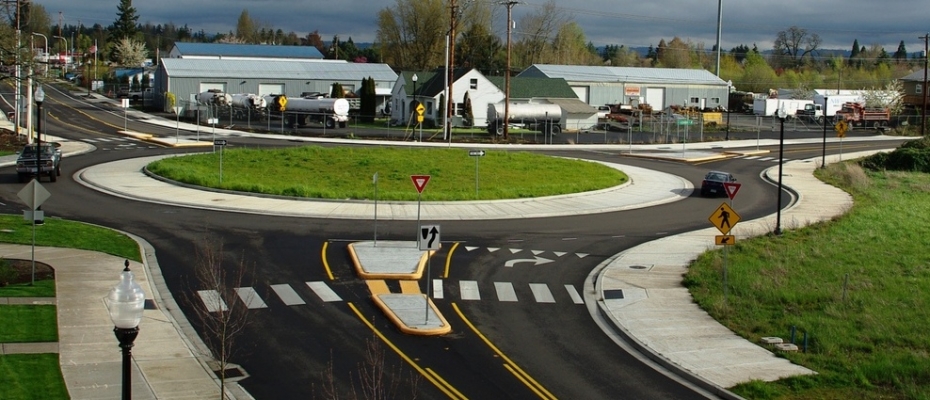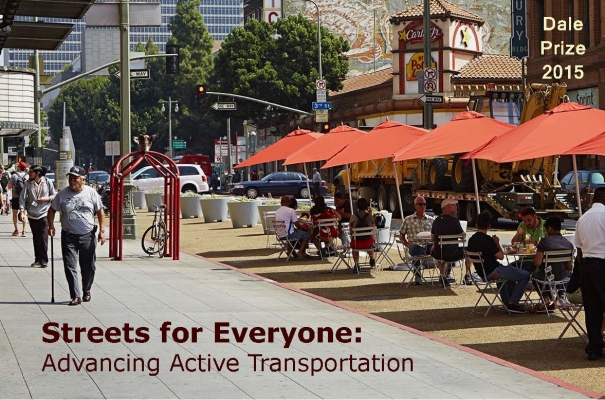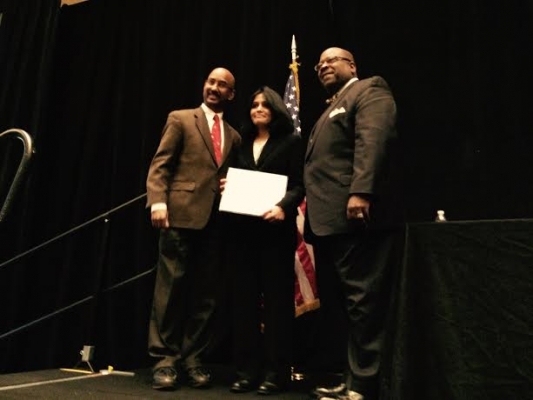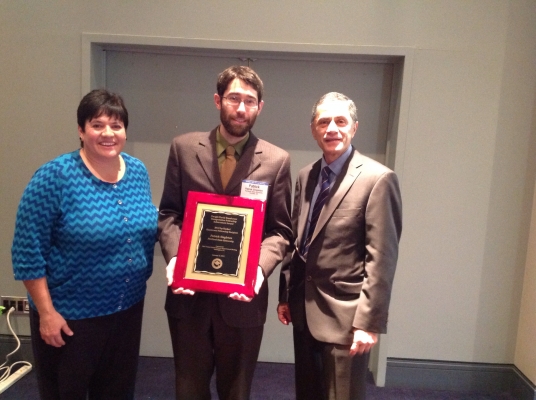To be published later this spring is some of the first bicycle-focused research into shared space, a controversial urban design approach pioneered in the Netherlands in the 1990s.
Allison Duncan, a PhD candidate in urban studies & planning at Portland State University, earned a NITC dissertation fellowship in 2014 and used the research grant to study shared space intersections in the United Kingdom.
Shared space designs have recently been adopted at a handful of sites in the UK and others scattered across Europe, Australia and New Zealand. They are characterized by a lack of physical guidelines such as curbs, road surface markings and traffic signs to define who has the right-of-way.
The idea is for pedestrians, cars and bicycles to mingle in a common zone and use eye contact and natural communication to make sure no one gets hurt.
“Cyclists and pedestrians are supposed to be able to treat it more like a plaza and just cross where they want to, and drivers are supposed to yield,” Duncan said.
As a street design scheme, shared space isn’t exactly new. It’s more or less the way all streets were designed until the advent of cars, and is still the norm in many Asian countries where cars share the roads with a crowd of two- and three-wheeled...
Read moreThe University of Oregon student group, LiveMove, shared lunch and an afternoon conversation on Monday, February 23rd, with Shelley Poticha, Director of the Urban Solutions program at the Natural Resources Defense Council (NRDC).
The lunch was held on OU’s Eugene campus in Susan Campbell Hall, where Poticha engaged in an afternoon Q&A session with students from LiveMove.
The topic was transportation and livability related issues, with 13 participants in attendance.
In the evening following the Q&A, Poticha gave a presentation in Lawrence Hall. Her focus was on addressing best practices for implementing key concepts of new urbanism, as well as detailing dynamic approaches for achieving these goals.
Through aiding in the development of greener neighborhoods and implementation of better regional planning, Poticha is a national leader in assisting cities with creating sustainable communities. Prior to joining NRDC she was a senior advisor and director of the Office of Sustainable Housing and Communities at the Department of Housing and Urban Development. Before joining HUD, she served as President and CEO of Reconnecting America, as well as the Executive Director of the Congress for New Urbanism.
LiveMove partnered with the Sustainable Cities Initiative (...
Read moreTo help maximize the US Department of Transportation’s commitment to livable communities, NITC has opened a second round of funding for the Transportation for Livable Communities Pooled-Fund Research program.
This program gives regional and local agencies more opportunity to be invested in research with a national impact. Through the program, cities, counties, MPOs and other regional or local agencies can pool research dollars to leverage NITC funds for a single project.
We are currently seeking partners to identify research needs. In the second round of Pooled-Fund Research, partnering agencies will work with NITC staff to develop a clear problem statement.
Once the research problem statement is identified, NITC will issue a request for proposals (RFP) to faculty and investigators at our partner universities.
Who can submit?
Any agency such as a city, metropolitan planning organization, county, transit agency, etc. can submit research problem statements relating to NITC’s theme of livability, incorporating safety and environmental sustainability. NITC expects that the agency or group of agencies submitting a problem statement will pool funds to contribute to half the cost of the project and be a member of the technical advisory committee.
We are asking that agency partners provide non-federal dollars that can be used to match the NITC...
Read moreShrinking cities, also known as legacy cities, are previously dense urban areas that have experienced significant population loss. Some of the most striking examples in the United States are historical automobile manufacturing cities like Detroit, Buffalo and Cleveland.
In these cities, the thinning of the population coupled with the decay of physical infrastructure creates unique transportation challenges.
University of Utah researcher Joanna Ganning set out to find a tailored solution for this problem using accessibility-based transportation planning.
She will present her research in a webinar on Thursday, February 19.
In contrast to mobility-based planning, which focuses on the cost of transportation per mile traveled, accessibility-based planning places its emphasis on whether people have access to their destinations.
Ganning believes that there is a heightened need for accessibility-based planning in urban settings with population decline.
“We know that increased population density makes transit more efficient. In urban decline you’re losing people, so you don’t have that working for you,” Ganning said.
...
Read moreShe will spend three months in Lisbon, Portugal starting in January 2016, where she will work with faculty at Instituto Superior Técnico (IST), part of the University of Lisbon.
Clifton will collaborate there with assistant professor João de Abreu e Silva, a fellow travel behavior researcher whose areas of interest lie in transportation systems and land use patterns, specifically in urban environments.
Clifton’s research into bicycle and pedestrian travel demand modeling and the consumer behavior of active travelers has the potential to be applied in downtown Lisbon...
Read moreMarc Schlossberg, a NITC researcher from the University of Oregon and member of NITC's Executive Committee, has received the rare distinction of being awarded a second Fulbright Scholarship.
Schlossberg was a Distinguished Fulbright Scholar to the United Kingdom in 2009-10, where he taught and conducted research around issues of sustainable transportation and community change at the University of Sheffield.He will spend his next Fulbright year in Israel, working with faculty at Technion–Israel Institute of Technology.
His primary focus will be on community and street transformations to support active travel, building on the foundation of Rethinking Streets, a book he coauthored in 2014.
Schlossbreg's research is largely motivated by the need for a more sustainable urban form...
Read moreJennifer Dill, professor of urban studies and planning at Portland State University and director of TREC and the NITC program, has been awarded the 2015 Dale Prize from California State Polytechnic University, Pomona.
She will spend Wednesday and Thursday at Cal Poly this week, attending a colloquium with students, educators and planning professionals and a formal banquet to receive the award.
The Dale Prize is an annual event organized by the department of urban and regional planning at Cal Poly Pomona. They recognize planning excellence with a pair of prizes each year: a $5,000 award to a scholar and a $5,000 award to a practitioner. Dill is receiving the scholar prize for 2015, and the practitioner prize goes to Fred Dock, director of transportation for the City of Pasadena, who is also a nationally recognized leader in multimodal transportation analysis and walking accessibility.
The department focuses on a different planning theme each year. This year’s theme is Streets for Everyone: Advancing Active Transportation.
Dill’s research into active transportation accessibility and mode share has made national headlines, most recently as part of the...
Read moreThe National Institute for Transportation and Communities (NITC) invites new proposals for general research in 2015.
NITC is the U.S. Department of Transportation’s national center for livable communities and one of five U.S. DOT national university transportation centers. The NITC program is a Portland State-led partnership with the University of Oregon, Oregon Institute of Technology, University of Utah and University of South Florida.
NITC is focused on contributing to transportation projects that support innovations in livability, incorporating safety and environmental sustainability. We will award at least $1 million to research and technology transfer projects that support NITC’s theme.
What's new in ths RFP
This request for proposals has a special emphasis on economic impacts. Up to $250,000 of these funds will prioritize research projects that study the economic impacts of livable communities.
All projects should range from $30,000 to $150,000 and must focus on research and technology transfer. Technology transfer proposals should support the application of transportation research to practice, including dissemination of research results, continuing education, and training.
... Read moreSirisha Kothuri, an active transportation researcher who received her doctorate from PSU in 2014, was announced as the NITC university transportation center student of the year on Saturday, Jan. 10 at TRB.
Kothuri, a former OTREC scholar and NITC dissertation fellow, devoted her doctoral research to optimizing transportation infrastructure for pedestrians. Her dissertation, "Incorporating Pedestrian Considerations into Signal Timing," focuses on ways to minimize the wait time at traffic signals experienced by people on foot.
Pedestrians are the most vulnerable group of road users, so safety is a top priority for many jurisdictions, with less focus being placed on travel time. Kothuri believes that there is a critical need to incorporate pedestrian considerations into signal timing design, in part because unacceptable delay can impact signal compliance and thus impact safety.
The overall objective of her research is to make traffic signals more responsive to pedestrian needs.
Findings from Kothuri’s research can inform practitioners in determining treatments that can benefit pedestrians by considering their needs and reducing delay.
On Tuesday of this week's TRB annual meeting, Kothuri presented a poster titled "Exploring Thresholds for Timing Strategies on a Pedestrian Active Corridor."
She will share more of her pedestrian research in a...
Read moreIn a morning workshop on Sunday at TRB's annual meeting, Patrick Singleton of Portland State University was named the top-ranked Eisenhower Fellowship recipient
The session featured innovative research from second- and third-year Eisenhower doctoral fellowship recipients from top universities across the nation.
Singleton was one of four civil and environmental engineering students from PSU to be awarded the Dwight David Eisenhower Transportation Fellowship in 2014.
The paper he presented, "The theory of travel decision-making: A conceptual framework of active travel behavior," integrates theories from economics, geography and psychology to arrive at a unifying framework for understanding and predicting active travel decisions.
It examines the thought processes behind individuals' short-term travel decisions and explains the roles of activities, built environment factors, socio-demographics, perceptions, and habit in influencing those decisions.
Singleton's award marks the second year in a row that a Portland State student has taken the top honor, following Kristina Currans.
Singleton's adviser, Prof. Kelly Clifton, said she's proud of his accomplishment and the continued achievement of Portland State students. "It shows the strength of the program," Clifton said.
... Read more








